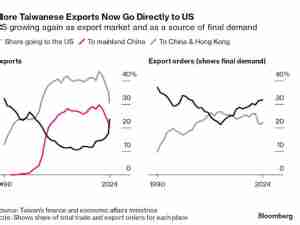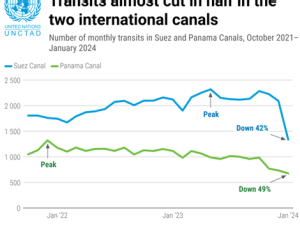Commodity exports from Ukraine, one of the world’s most important grain suppliers, were thrown into chaos after Russia’s invasion forced ports and railways to start closing.
The country’s Presidential Office said that its ports were closed, while one of the biggest rail users said the government had suspended operations. Ukrainian ports were still loading and unloading commodities from ships already berthed, but traders could no longer book vessels to move goods in and out of the nation’s ports, people familiar with the matter said earlier.
Ukraine’s rich, fertile soils have earned its nickname as the breadbasket of Europe. The country is the second largest global grain shipper and a major sunflower oil exporter. It’s also an important regional producer of iron ore pellets and steel. Nearly all the commodities Ukraine produces are bulky goods that require train and port infrastructure to move.
Ships that were loading have been told they will be allowed to leave, but those waiting to berth won’t be able to dock, said one person familiar with the matter. At least four ships that were sailing for ports in Ukraine had stopped before reaching their destinations and were floating in waters miles from the country, according to tanker-tracking data compiled by Bloomberg.

The situation is already rippling out through the global grains trade. Egypt, the biggest wheat importer, had scheduled a purchase tender on Thursday—it extended its deadline for submissions after only receiving one offer. Russian and Ukrainian wheat both tend to feature prominently in Egyptian tenders.
At least one vessel was loading wheat at a port in Ukraine for Egypt’s General Authority for Supply Commodities but stopped and the crew returned to their hotel, said a person familiar with the matter.
Ukrainian iron ore miner Ferrexpo Plc, said the government had suspended rail transportation in the county. That means that even if ports reopen, shipments will halt once portside stockpiles run dry. Steel giant ArcelorMittal said it slowed production at its plant to a “technical minimum” and would stop output from its underground iron ore mines.
Banks have also restricted financing of commodity movements within Ukraine, with some having pulled out altogether, according to people familiar with the matter. Grain traders were struggling to get financing for the bushels stored in bins across the country, said the people, who asked not to be named speaking about sensitive topics.
Some European banks had also begun restricting exposure to commodity trading in Russia and Ukraine before the invasion in anticipation of possible sanctions, people familiar with the situation said.
Crucial agriculture prices are already spiking. Wheat and corn markets surged by the maximum allowed by the Chicago exchange, with futures for both crops jumping by more than 5%, while wheat in Paris rose as much as 16% to a fresh record.
Russia’s ports on the Black Sea and elsewhere are operating normally, but shipping in the Azov sea is suspended, Russia’s Federal River and Marine Transportation Agency said by email.
Russia launched a barrage of missile, artillery and air attacks early on Thursday. Ukraine’s border guard said that it was being shelled from five regions, including from Crimea in the south and Belarus to the north, as Russian tank columns moved into the country. Ukraine’s Interior Ministry said that the capital, Kyiv, was under attack and urged citizens to go to shelters.
Moscow has confirmed it is targeting military facilities across the country and Ukraine’s border guard said it was being shelled from five regions, including from Crimea in the south and Belarus to the north. Prices of oil, crops, metals and European energy surged, and the West vowed further sanctions.
Ports are dotted along the Sea of Azov—which is connected to the Black Sea by a strait that runs between Russia and Crimea, which Russia annexed in 2014—and on the Black Sea coast further west. The southwestern ports of Odesa, Pivdennyi, Mykolayiv and Chornomorsk handle almost 80% of Ukraine’s grain exports, according to researcher UkrAgroConsult.









